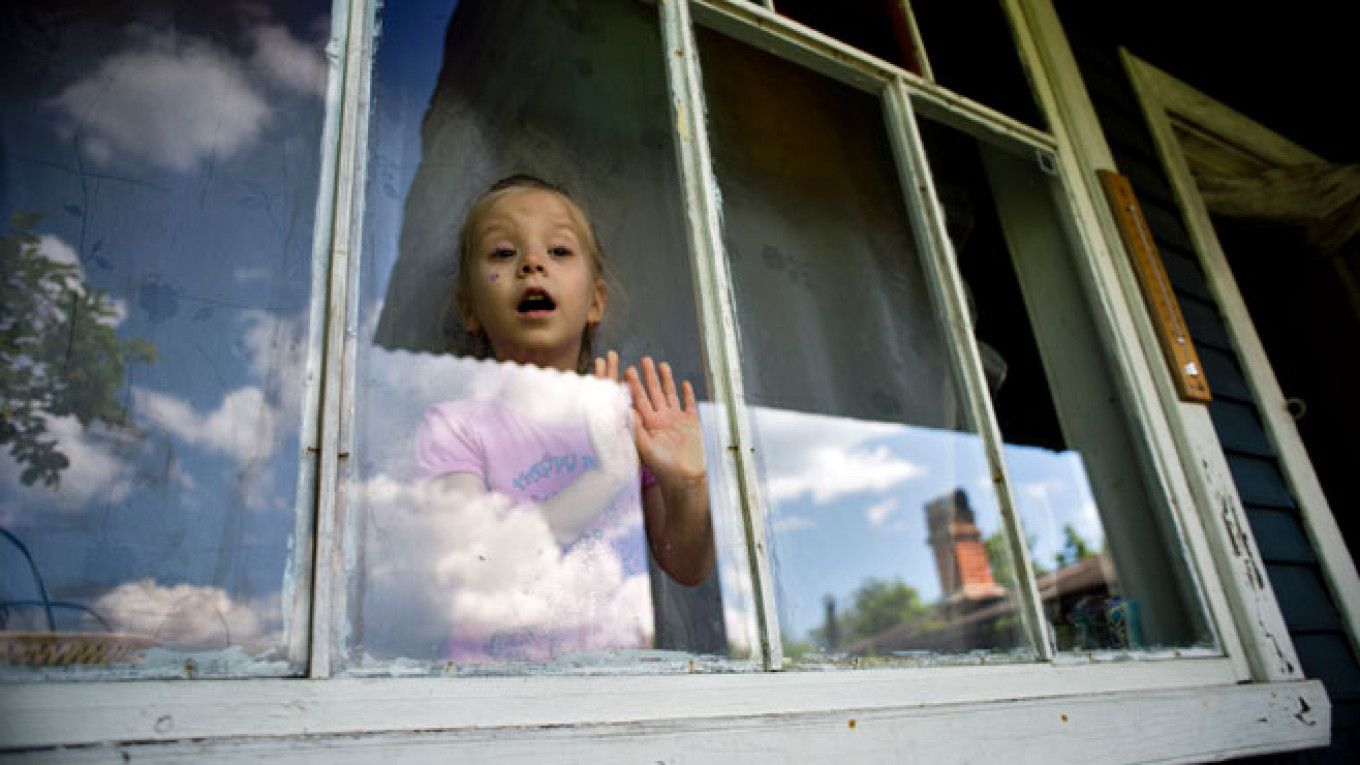As helicopters routinely monitoring for wildfires fly over the Moscow region, four-year-old Masha Kislovskaya fears that shelling will follow suit.
"Grandmother, are they going to shoot again?" she asks Olga Sadomichenko, 66, in a dacha near the village of Akhmatovo, 90 kilometers southwest of Moscow.
Masha and her grandmother fled from Kramatorsk, one of the strongholds of the pro-Russian insurgency that was captured over the weekend by Ukrainian forces. Provoked by a bomb that hit Masha's kindergarten but fortunately failed to detonate, the two escaped just before the conflict reached its peak. ?
Despite Akhmatovo's balmy weather, Masha prefers to remain indoors. Mitch, the dacha's resident dog, is the only one capable of luring her out to play in the courtyard under the shade of an apple tree.
Sadomichenko has been friends with the dacha's owner Mikhail Kasitsin for years. After watching yet another news broadcast from conflict-ridden eastern Ukraine, he called her up and offered his dacha as a safe haven.
See our photo gallery: Ukraine Refugees Find Save Haven Outside Moscow
The Journey to Moscow
Masha was left in Grandma Sadomichenko's care after her mother Yulia was forced to relocate to Kiev in April to support the family financially. The child's father left long ago.
By the time Sadomichenko decided to leave Kramatorsk, water and electricity had been cut off from their apartment. During increasingly brutal spells of shelling, they were shuttled to a bomb shelter. ?
The trip to Russia was long and arduous.
With only one suitcase to carry all their worldly possessions — consisting of little more than toys and a few items of clothing, the duo began by catching a bus to Donetsk.
They bypassed four military checkpoints before arriving at a train station, only to learn that tickets? to Moscow had sold out completely. Sadomichenko begged the conductor to let them in.
She relented, but on the condition that the child and her grandmother had to sit curled up near the linen storage for almost the whole of the trip. The conductor did, however, let them sleep in her compartment for several hours.
"The conductor told me that of the 54 people in the train car, 52 were Ukrainians," Sadomichenko told The Moscow Times, sitting in a small dining room of a typical Russian dacha.
"Everyone was silent. They were petrified with grief. In Kramatorsk, nobody talks about bombardments because they are so afraid. What they talk about is when the water will begin to flow through their pipes again," she said.
Nobody to Blame
Despite the recurrent sense of anxiety and loss, Sadomichenko has no desire to blame the conflict on either the rebels or the government. While she believes that it would be better for her town and region to stay within a unified Ukraine, she argued that these territories deserved greater political representation.
"There is a civil war over there that will not end until one side eradicates the other," she said.
"The problem is that even when one side emerges victorious, the defeated side will not forget it. There will be this sense of grief that will not go away," she said.
Sadomichenko dismissed all claims that the rebels were supported by Russia or boasted Russians among their ranks.
"What Russian troops?" she wondered. "They were all our guys — Ukrainians. There were no Russians over there," she said.
People turn to Russia today because the country offers such basic necessities as shelter, food and work, she said.
Kasitsin added that even in the tiny village of Akhmatovo there are half a dozen maintenance crews, who — having newly arrived from western Ukraine — wander door to door, looking for work.
Statistics
More than 480,000 Ukrainians have fled to Russia since the start of the violence, Anatoly Kuznetsov, deputy head of Federal Migration Service, said at a Civic Chamber meeting on Monday. Of those, 16,000 are residing in temporary shelters, including in the Moscow region. Only 20,451 have formally filed for temporary asylum so far, he said.
Kasitsin is not alone in volunteering to provide shelter for Ukrainian refugees in his home. Russian newspaper Moskovsky Komsomolets runs a regular section featuring public invitations from families willing to take refugees in. ?
Sadomichenko and Masha plan to stay at Kasitsin's dacha until August, with hopes that their apartment will stay intact for them.
"I lived there for more than 50 years, bought furniture, saved money to improve the apartment and now suddenly we are afraid that a bomb will fall and destroy it all," she said, tears welling in her eyes.
Contact the? author at [email protected]
A Message from The Moscow Times:
Dear readers,
We are facing unprecedented challenges. Russia's Prosecutor General's Office has designated The Moscow Times as an "undesirable" organization, criminalizing our work and putting our staff at risk of prosecution. This follows our earlier unjust labeling as a "foreign agent."
These actions are direct attempts to silence independent journalism in Russia. The authorities claim our work "discredits the decisions of the Russian leadership." We see things differently: we strive to provide accurate, unbiased reporting on Russia.
We, the journalists of The Moscow Times, refuse to be silenced. But to continue our work, we need your help.
Your support, no matter how small, makes a world of difference. If you can, please support us monthly starting from just $2. It's quick to set up, and every contribution makes a significant impact.
By supporting The Moscow Times, you're defending open, independent journalism in the face of repression. Thank you for standing with us.
Remind me later.


